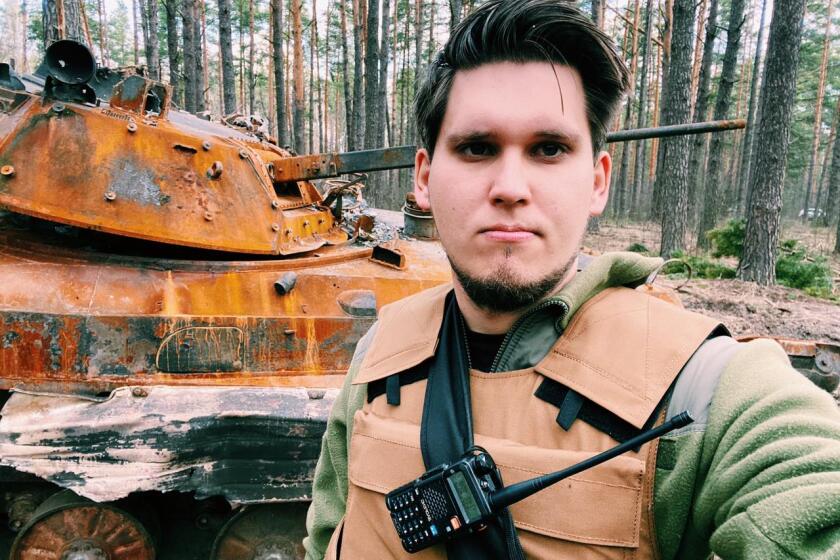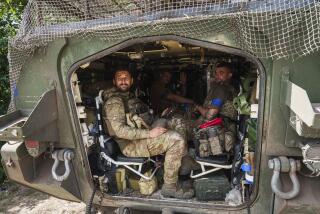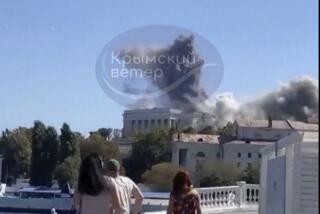Russia pushes deeper into Mariupol, where a dwindling Ukrainian force puts up what may be its final fight

Mariupol, the strategic port city, has been the scene of relentless Russian attacks during the seven-week war.
- Share via
KRAMATORSK, Ukraine — Russia stepped up its attacks on numerous fronts in Ukraine on Saturday, moving deeper into the besieged southern port of Mariupol and striking a suburb of Kyiv as well as an area near the major western city of Lviv as Ukraine endured what many here believe is Russia’s wrath over the sinking of the flagship of its Black Sea fleet.
Several Ukrainian civilians were reported killed, even as Russia appeared to be targeting crucial military sites, including weapon storage depots, to cripple Ukrainian forces ahead of what is expected to be a protracted and even bloodier battle for the eastern portion of the country.
What was likely a final struggle for control was playing out in Mariupol, the strategic city that has been the scene of relentless Russian attacks during the seven-week war. Ukrainian officials deny the city has fallen, but its last defenders appeared to be holed up and dwindling in numbers amid a desperate fight.
Russia said it had cleared all of the urban sections of the city and surrounded a massive steelworks plant where the last resisting soldiers remained — a claim that could not be independently verified.
“The situation is very difficult” in Mariupol, Ukrainian President Volodymyr Zelensky said Saturday in comments published by the website Ukrainian Pravda. “Our military is blocked, the wounded are blocked.... No food, no water, no medicine. Nevertheless, the guys are defending the city.”
He repeated allegations that Russia is forcibly deporting Ukrainians from Mariupol and that Russia refused to allow humanitarian corridors out of the port city Saturday.
In Ukraine’s east, Russia pushed ahead with a buildup of troops and military materiel in advance of the looming offensive, while continuing to rain indiscriminate-seeming shellfire on towns and cities that Ukrainian officials have urged civilians to flee.
Ukraine has been girding itself for the battle in the east for weeks. In recent days, flatbed trucks carrying tanks as well as convoys of military vehicles have become a more common sight on the streets of the eastern town of Kramatorsk, many of them heading farther eastward into the industrial Donbas region.
Strikes hammered targets across the east. Russia’s military claimed to have wrecked a military repair facility in the city of Mykolaiv, near the Black Sea, and to have downed a Ukrainian aircraft in the Kharkiv region, in the northeast.
Overnight bombardment in Severodonetsk cut a central gas pipeline to the eastern city, which also lacks water, the regional governor said Saturday. Such infrastructure losses have contributed to a dire humanitarian situation in many towns and cities, a key reason why about 1 in 4 Ukrainians are displaced.
Near the western city of Lviv, which has been a relatively safe haven for much of the war, explosions Saturday were blamed on an attack originating on the territory of Russia’s ally Belarus, the regional governor, Maksym Kozytskyi, said on the Telegram messaging app.
With Russia threatening to step up strikes on Kyiv, Mayor Vitali Klitschko reported that rescuers and medics were dispatched to the site of a blast on the eastern edge of the capital. Russia’s Defense Ministry said a strike hit an armored vehicle plant.
After weeks of relative calm in the city, Klitschko appealed to residents to not ignore air-raid sirens. The mayor also sought to discourage those who fled when Kyiv was under Russian attack from returning home — especially to suburbs and satellite towns where investigators have unearthed evidence of mass atrocities against civilians during Russia’s monthlong occupation.
The Russians left behind a landscape littered with mines and booby traps, and Ukrainian officials have tallied at least 900 deaths, nearly all civilians.
Military casualties mounted as well. In an interview Saturday with CNN, Zelensky said Ukraine’s combat fatalities were far outnumbered by losses suffered by Russia. He said between 2,500 and 3,000 Ukrainian troops have died while Moscow has lost 19,000 to 20,000 troops.
Russia has not released military casualty counts in weeks. Last month, the Defense Ministry reported 1,351 soldiers killed, a figure that Western experts at the time called unrealistically low. Later, Kremlin spokesman Dmitry Peskov acknowledged “significant” troop losses, which he called “a huge tragedy for us.”
Even as Russia continued to deny that Ukrainian missiles were responsible for the sinking of its mammoth missile cruiser Moskva on Thursday, Ukrainians rejoiced over yet another underdog win — but with the grim expectation that Moscow would seek maximum vengeance.
Named for the Russian capital, the Moskva was a source of national pride. Russian officials claimed the ship accidentally caught fire, causing a damaging munitions explosion, and then sank in stormy seas while being towed to port.
Western military officials, however, support Ukraine’s version of events, saying the vessel was believed struck by two Ukrainian-made Neptune missiles. Ukraine says the attack killed the ship’s captain, and the fate of much of the 510-member crew remains unknown.
Despite the loss of the ship, Ukrainian military officials said Saturday that Russian naval vessels in the Black Sea still posed a major menace, with the likelihood that sea-launched missiles would be used to pummel key armament plants. They said the Russian navy is also active in the siege of Mariupol.
Russia is intent on capturing the city, which sits on the Sea of Azov, to enable Moscow to create a land corridor between Russian-held eastern territories and the Crimean peninsula, which it seized eight years ago.
A bustling metropolis of more than 400,000 before the war, Mariupol is now a ruined ghost town, the scene of some of the war’s most harrowing suffering. Tens of thousands of civilians have been unable to leave and thousands have died.
In an overnight address, Zelensky said the success of Ukrainian forces was “historically significant” but also insufficient. He again appealed for more heavy weaponry from Western allies and said countries that truly want
to help Ukraine must turn off the spigot of Russian oil — a dramatic step that Europe has been reluctant to take, though it has made some tentative moves toward an oil import ban.
“In general, the democratic world must accept that Russia’s money for energy resources is in fact money for the destruction of democracy,” the president said.
The White House, asked Friday about reports that Zelensky is pressing President Biden to declare Russia a state sponsor of terrorism, said the U.S. is considering a full range of options to put pressure on Russian President Vladimir Putin.
It is only a little over three weeks until Victory Day, the May 9 holiday in Russia that marks the then-Soviet Union’s triumph, at terrible cost, over the Nazis. Many analysts believe that Putin is determined to have some military win in Ukraine to point to by then, no matter the cost and scope of the brutality to achieve it.
More than 4.6 million Ukrainians have fled since Russia invaded, but millions more have stayed to help defend their country. These are their stories.
After Russia failed to seize Kyiv in the initial weeks of the war, Putin announced a scaled-back goal of “helping” Russian speakers in the Donbas region, part of which is already held by Russia-backed separatists. That is interpreted as meaning Russia aims to seize the remainder of the regions of Luhansk and Donetsk, which contain a number of major cities and towns.
There were nine agreed-upon humanitarian corridors available Saturday out of the eastern battle zone, Ukrainian officials said, but the journey out is always perilous, and many people are reluctant to leave their homes despite the danger of staying.
In Kramatorsk, a city in Luhansk where a devastating Russian strike on a train station filled with would-be evacuees killed some 60 people April 8, departures have slowed to a trickle.
On Saturday, only two buses were set to leave Kramatorsk’s bus station, and by late morning, only a handful of people had arrived to begin the journey westward.
Bulos reported from Kramatorsk, King from Warsaw and Wilkinson from Washington.
More to Read
Sign up for Essential California
The most important California stories and recommendations in your inbox every morning.
You may occasionally receive promotional content from the Los Angeles Times.
















